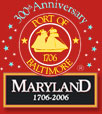Explore Port Careers
All about...
Tug Boat Operators
What a tug boat operator does . . .
Tugboats are the Port’s workhorses. Although they are small and compact (making them easier to maneuver), they are very powerful. The engines on smaller tugs produce between 750 and 3000 horsepower. Engines on larger tugs produce up to 25,000 horsepower. Tugs put that power to good use, pushing or towing vessels into their berths (their space at a dock) in a port. Without the help of the tugs, today's giant ships would never be able to make it into the berth, because they are not able to turn as quickly as a tugboat. Sometimes, tug boats help move cargo on barges from one area to the next or help in rescue missions.
The crew of a tug boat is usually small, especially since technology has helped automate a lot of processes that once were done by hand. The boat’s captain commands the boat and supervises the work of the crew. The crew can consist of mates, engineers, cooks, and deckhands; with a small crew people double up on jobs.
Career Tidbits
- Both the captain and the crew on a tug boat must be licensed by the U.S. Coast Guard. Most people come into these positions through formal training facilities, such as the U. S. Merchant Marine Academy or the other state academies listed here. But, students also have to pass tests to earn their “papers,” which are certificates that allow them to complete various jobs.
- Tugs have been around since the 1800s and helped ferry Union troops into Fort Sumter during the Civil War.
A person involved in tugboat operations typically has:
These skills and abilities:
Good leadership and analytical skills, good mathematics skills (especially in algebra and geometry), and common sense, high levels of responsibility and attention to detail
This knowledge:
- Correct operating procedures for a variety of water craft
- How properties of mechanics and physics work
- Principles and applications of navigation and the mathematics involved in it
- How technology can be used to help complete tasks
This training:
To be employed on any seagoing position today, a Transportation Worker’s Identification Credential from the Transportation Security Administration and a Merchant Mariner’s Document from the Coast Guard is needed. As tugboat operators progress in their career, they will need to obtain numerous licenses and endorsements from the Coast Guard to serve in positions of increasing responsibility. They are earned through a series of tests of the knowledge and skills learned from time spent on the job, also called Sea Time.
People in this industry typically learn on the job. However, classes and study books are often used to prepare for the licensing tests. There are numerous schools that offer this kind of training.
Once licensed, people need to be retested periodically to maintain their current license or endorsement.
This education:
Although these positions do not necessarily require a high school diploma or a college degree, people interested in this career often attend one of the five merchant marine academies in this country to study and prepare to be licensed. These academies offer both bachelors and masters degrees.
There are many paths to take in pursuing a career in tug boat operations, based on job experience and on-the-job training. There are ‘deck’ tracks that can take someone from an ordinary seaman to able-bodied seaman to bosun to mate to captain. There are also engine tracks that can take someone from a wiper to a qualified member of the engineering department to an assistant engineer to a chief engineer. People can also choose from brown water (inland) and blue water (deep sea) opportunities.
This position starts at different levels. The ‘hawse pipe’ route is nearly all on-the-job training. In this career path, people start at the an entry level position and go on to a deck or engineering officer.
People interested in this career area often go to technical schools offering courses in maritime studies.
Tug boat operators are critical in docking ships …
Find out about other careers at the Port.





